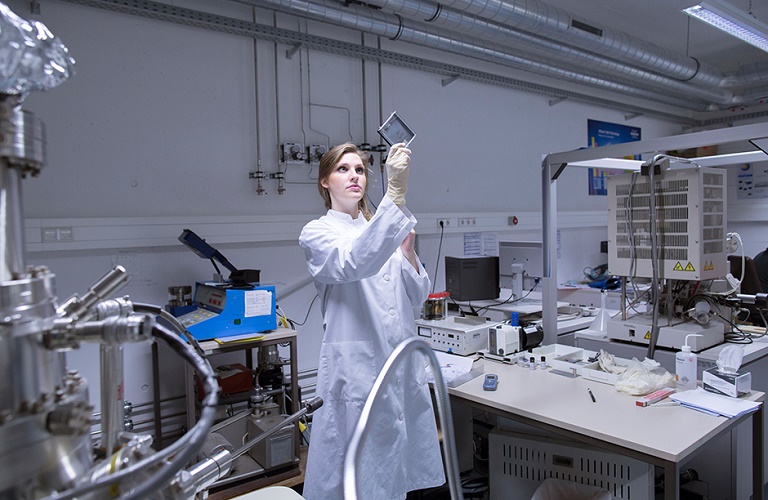
IBM Garage: Public sector innovation and transformation
01
6 min read
Think about public initiatives in new ways
In our society built on technology, governments are expected to provide world-class services while increasing citizen engagement and trust. The public wants government technology solutions to have the same agility and efficiency seen in the private sector—which means current processes require digital transformation.
In fact, 75% of government leaders say traditional business models are not sustainable in the current environment.¹
To meet the public’s expectations, governments aren’t just experimenting with technology. They’ve begun to transform their core strategy and processes. For example, cloud enables digitization of the healthcare and life sciences ecosystems. As a result, these areas can create and support new business models that improve the customer experience. That’s why 78% of healthcare and 85% of life sciences companies are already operating in a multicloud environment today.²
So, what’s holding the public sector back?

There are unique challenges to digital transformation programs in the public sector, like longer-than-average approval cycles, less comfort with ambiguous outcomes, and additional levels of confidentiality and data security. And that was before the COVID-19 crisis. This pandemic challenges governments to provide testing, quarantine assistance and contact tracing at scale, while delivering crucial benefits for citizens suddenly at risk of homelessness and food insecurity. Healthcare providers are experiencing supply chain issues. They also have a new, critical need for secure interagency data sharing. It's a once-in-a-generation event, and it’s never been a more important time to support organizations at all levels in the public sector.
To respond to these emerging challenges, IBM put its full force of industry expertise, problem solvers and technologists to work with the world’s healthcare workers and first responders. We’ve stood shoulder to shoulder building apps that run hospital operations and patient tracking, kept networks running in public safety departments that dispatch ambulances and ensured vaccine research data models are computing accurately and flowing in a security-rich manner to the cloud. But we believe that together, we can do more. That’s why IBM has brought a new capability to our work with government and healthcare clients—IBM Garage™.
IBM Garage: The secret to long-term solutions

The IBM Garage is a comprehensive approach to organizational change that helps accelerate innovation and transformation. We bring a team of IBM experts with diverse skills sets, such as designers, architects, developers, data scientists and cybersecurity specialists, who work with you to quickly create and scale new ideas that can dramatically impact your organization and drive results. This collaborative approach helps you power digital transformation and culture change across your organization through new ways of working, leading technologies and multidisciplinary experts.
Working with IBM Garage can help clients realize significant business benefits. A recent study found that Garage clients experienced:
The Garage helps you accelerate your success by harnessing the latest in AI, hybrid cloud, talent and accelerators from all parts of IBM. If you need to be more agile or innovative, want to benefit from being more design and user-research led, or think you could level up your team's skills through a co-innovation program, this engagement model is your entry to the full breadth of IBM talent and technology.
Read on to learn more about the IBM Garage approach and our point of view on today's critical needs in the government and healthcare industries. In each chapter, you'll learn about some key findings from IBM Garage projects over the last several years, followed by a client story to show real results.
02
4 min read
Transform your day-to-day with the IBM Garage
The value of the Garage Methodology can be summarized with the phrase: startup speed at enterprise scale. To help modernize your approach, we combine best practices like design thinking, agile methodology, DevOps and site reliability engineering (SRE) with the industry expertise we’ve developed by working with the world's largest companies and organizations. Working within the constraints unique to the public sector, we help involve stakeholders early and limit innovation blockers. As a result, you can modernize how departments operate with intelligent workflows, allowing teams to be more collaborative, responsive and security-rich.

Our approach starts with your business outcome, not a technology. Using design thinking, we work with the right people in the physical or virtual room to help align on your opportunity or challenge, the user or users being addressed, and the hypothesis and the minimum viable product (MVP) to test. These data-driven Garage teams are dedicated and determined to help you achieve your goals. The resulting MVPs are not proofs of concept, but rather production pilots in the hands of real users that help you to test for market and community fit.
From the MVP, we then work with you to iterate and scale. Together, we become agents of change within your organization by co-creating, co-executing and co-operating to evolve the skills and mindsets of your teams. The skills and working methods developed as the project builds help create long-lasting culture change and drive purposeful innovation. During this process, we've seen one squad turn into dozens, one app into hundreds and multiple siloed departments into an integrated innovation program that continuously learns and adapts.

IBM Garage brings various IBM experts, such as designers, architects, developers, data scientists and cybersecurity specialists, to quickly create and scale new ideas that can dramatically impact your organization and drive results. And, of course, the resulting architecture can include all the enabling technology needed, such as IBM Cloud®, multicloud, data, machine learning (ML) and AI, IBM Watson®, blockchain, Internet of Things (IoT), security, Salesforce and Adobe solutions, and more. The Garage Methodology helps you power digital transformation and culture change across your organization through new ways of working, leading technologies and multidisciplinary experts.
03
5 min read
Improve citizen experiences
Whether providing access to everyday services, such as polling place locations, fulfilling passport requests or providing the critical and life-saving measures in times of disaster, citizens expect a business-to-consumer (B2C) quality experience when accessing digital public services from the government.

Some governments have improved website user experience (UX), but few have truly changed the way citizens interact with them. Not only is your UX important, but your ability to quickly answer citizens’ questions is crucial. Virtual assistants can provide swift, round-the-clock answers to common questions and needs. Yet relatively few organizations have implemented them.
COVID-19 impact: The pandemic caused employment instability in many areas of the world, creating an insatiable need for governmental services and aid. In some states and countries, applications for services take weeks or remain incomplete.
The Garage approach
By leading with human-centered design in every engagement, the IBM Garage puts people at the center of everything we do. We do this by using Enterprise Design Thinking to help gain a clear understanding of your users and empathize with them to drive results. As solutions come to life, we work with you to use empathy mapping, interviewing and research to continuously prototype, test and validate ideas with real users. By formulating the MVP and hypotheses to prove whether the MVP provides what your users need, we can test, learn and pivot until we deliver the desired outcome. With Enterprise Design Thinking, teams can work more efficiently and come to better solutions faster by staying aligned and keeping people at the center of their work.
The IBM Garage has also developed design language systems for digital experiences that assist with speed, consistency and usability. The Garage team members that are UX and user interface (UI) designers have deep expertise creating engaging omnichannel experiences for B2C clients than can be applied in a public sector context for maximum results.
Client story
Nova Scotia and IBM launched Canada’s first public sector Garage program in Halifax in March 2018. The Garage helps the public sector of Nova Scotia deliver services and programs more efficiently and effectively by leveraging agile development methods and leading technologies.
The Canadian Institute of Health Research estimates that 40,000 cardiac arrests occur every year in Canada. Almost all of them, up to 85%, happen outside the home. Which means that knowing the location of the nearest automated external defibrillator (AED) can turn almost anyone into a first responder. IBM Garage and Nova Scotia launched a mobile app to quickly locate nearby AEDs through IoT sensors.
IBM now delivers an ongoing Garage program for Nova Scotia, with multiple high-impact, high-return projects for departments across the provincial government. The group saw a return on investment of 7 to 10 times the government’s modest investments in individual projects even before completing the first year.
Read the full case study to learn more
04
6 min read
Unlock the power of patient data
Today’s abundance of data fuels digital transformation. AI unlocks the value of that data, which helps secure its status as one of the defining technologies of our time. And the public sector is no exception—data analytics and AI hold largely untapped potential for patient insights and outcome. Originally, organizations created their information silos out of reasonable concerns, including security, privacy, regulation and internal competition. But the resulting lack of data interoperability across organizations was cited by both payers and providers as their biggest hurdle to innovation, followed by insufficient funding for new projects and the need to maintain security.⁵

Technology, like AI, has allowed some organizations to break down silos to drive better performance and foster greater innovation. However, more often than not, the ability to share information across organizations is still limited. Successful providers and payers focus on ways to ensure their new systems create reliable, interoperable data that still maintains security and compliance. The incentives to drive patient outcomes through an ecosystem-wide data exchange are too great to ignore any longer.
Ultimately, the successful adoption of AI remains challenging without a hybrid multicloud platform. This platform can unleash the value of data, which is why leading businesses are investing in multicloud and AI in new ways.
COVID-19 impact: Many government agencies, public institutes and private life sciences companies are working at an unprecedented pace to create and test vaccines, process virus testing kits and trace virus cases within communities. These organizations must swiftly and securely share accurate data with other agencies to facilitate these life-saving initiatives.
The Garage approach
Whether the data exists in a hybrid cloud environment or not, analyzing data doesn’t just expose efficient insights. The true power of data comes from joining data sets together for end-to-end views that deliver intelligence. That’s why the Garage team infuses AI into your applications, processes and skills to quickly identify the impact of AI. We use our deep expertise to select, develop, evaluate and optimize your AI and data science models to make them ready for production. As a result, you can harness the power of AI to radically improve predictions, automation and optimization, helping make the right decisions faster and more accurately.
The Garage uses an AI framework and accelerators. These tools were developed by the team for implementing the workflow and technology platforms required to enable production-grade machine learning (ML). This framework relies heavily on open source principles and software development patterns tested during many engagements and across industries. The tools also include use case templates, standardized AI and ML algorithms, pipelines, opinionated project scaffolding and services adapters.
As our teams are deeply skilled in data privacy and highly regulated workloads, our solutions are designed to have security built in. By providing AI at scale, your government or healthcare organizations can make large strides in a security-rich and agile manner.
Client story
Hepatitis C is curable. Many people in Louisiana weren’t aware they had the disease, therefore they weren’t diagnosed or seeking treatment. Once they’re diagnosed with hepatitis C, they often face multiple barriers to accessing treatment. The most vulnerable populations face challenges that aren’t solved by one-size-fits-all technology solutions and require scalable solutions as nuanced and diverse as the people who seek them.
Through the collaboration and co-creation between the State of Louisiana Department of Health and IBM Garage, the outlook for a hepatitis C cure is much brighter. With affordable medicine, a community-based approach and IBM’s expertise in cloud technologies and data integration, a “hep C-free Louisiana” is closer to becoming a reality.
Read the case study to learn more
05
4 min read
Build intelligent workflows
Workflows are how things get done in an organization. Intelligent workflows are predictive, automated, agile and transparent. By making workflows smarter, you can increase the confidence and speed in how decisions are made, empower people to do higher-value work and create more meaningful experiences for citizens and employees.

Automation technologies are developing at a breathtaking pace, meaning leaders have to prioritize areas to automate and choose between technologies. There are numerous use cases for automation in the public sector, but here are a few recent Garage project examples:
The Garage approach
Because processes are complex and automation technologies are new to most organizations, clients often don’t know what they can improve and how. The Garage approach provides a holistic and agile approach to derisking your transformation objectives that can improve business resiliency and outcomes. Work with us to help you evaluate how your organization is doing business now—the “as-is” process—and what capabilities we can bring to have a better—or “to-be” process. Together, we can explore how to improve efficiency, reduce costs and introduce new revenue streams through intelligence.
By creating and validating a hypothesis through co-creation and co-execution, we’ll identify focus areas, establish priorities and quickly prove the benefits and outcomes of automation in a specific focus area. You’ll be provided with the right tools, capabilities, processes and data sources to digitize and automate your work, creating intelligent workflows and augmenting your workforce in that area. Along the way, you’ll collaborate with technical experts and thought leaders from IBM solutions in automation, Watson, blockchain and IoT as solutions are defined, built and scaled. Then we’ll move right to the next focus area.
Client story
With a vision to become a smart hospital, Asan Medical Center (AMC) was seeking to improve operational efficiency and customer service by employing transformational technologies. AMC collaborated with IBM Services to automate bed allocation and inpatient reservations through intelligent automation, using the IBM Garage Methodology. This helped AMC allocate beds up to 20 minutes faster and reduce the workload of hospital staff by three hours per day.
06
7 min read
Accelerate the journey to cloud
Your journey to cloud is unique. Governments and healthcare organizations have a mix of commercial, off-the-shelf, SaaS and homegrown applications on premises and across multiple cloud environments that need to function as one cohesive infrastructure. You’ve finished the easy builds, integrations and migrations, but with such a complex IT estate, help modernizing and moving your mission-critical IT infrastructure with the cloud is key.

In addition, with the accelerated adoption of technology to solve an increasing number of public sector challenges, the number of threats also grows. CISOs must consider and address concerns like citizen and patient privacy, digital trust and transparency, regulatory compliance, securing edge computing devices and many others.
COVID-19 impact: The increased demand for public services has put additional strain on already aging government IT infrastructure and processes. As employees moved to remote work, some governments didn’t have robust digital workplace technology in place, such as scaled VPN infrastructure or cloud-based email and web conferencing.
The Garage approach
IBM Garage has helped thousands of clients make decisions about their unique journey to cloud. Deeply skilled in all aspects of hybrid cloud, our experts use hybrid cloud to help improve your public and private clouds by offering flexibility and balance. With this strategy, you can effectively manage speed and security, lower latency and drive higher performance. Every application and service can be deployed and managed where it makes the most sense.
From modern, cloud-native apps and microservices to traditional, monolithic software and systems, the IBM Cloud® platform was designed to support the full range of applications across public, private and hybrid environments. With this platform, you’ll have the infrastructure needed to help build new applications from scratch or modernize existing applications—or both.
Open platform. Build on Kubernetes container infrastructure for public and private cloud once, and place applications and workloads wherever they run best.
Integration solutions. Use cloud tools, such as messaging, gateways and application programming interface (API) management, to bring together new and existing applications and workloads.
DevOps. Accelerate the development and implementation of hybrid applications with synchronous deployment of components on public and private cloud.
With the IBM Garage, you can accelerate the move of your IT infrastructure and applications to multicloud. We’ll work with you to incorporate intelligent insights, automation and integration within your cloud provider ecosystems. Using AI and machine learning techniques, our experts can help you significantly reduce the time and effort needed to process new sources of information, deriving insights for your cloud transformation roadmaps as you go.
We start by analyzing your organization’s current cloud capabilities with our Cloud Advisory Tool to inform the enduring business and technology roadmap we’ll custom-build for you. With this information, we can automate parts of your move to cloud by using one-click migrations for known patterns. This approach also helps reduce errors from manual migration-related activities.
We understand that organizations are moving their manual and reactive security programs to a more automated and proactive approach, so every Garage solution is designed to have security built in. Through IBM Garage, you can also explore key use cases like threat management, cloud security, data security, identity and access management, and zero trust to get you closer to your security goals.
Client story
Blue Cross Blue Shield of Massachusetts (BCBSMA), a large health insurer, sought a modern, cloud-based technology platform to better handle transaction spikes as the company grows.
Working with the IBM Garage, BCBSMA chose to modernize and test mission-critical apps on IBM Cloud Pak™ for Applications on Red Hat OpenShift software. The scalable, containerized infrastructure incorporates new technologies while retaining—and evolving—existing IT investments.
Through co-innovation and applying Garage Methodology, the BCBSMA team saw results in just 4 weeks and learned new ways of working.
07
7 min read
Modernize your organization’s talent and culture
Government agencies have long recognized the need to recruit and retain talent in order to keep pace with the requirements of citizens and digitally transform their organizations. To attract talent from younger generations and modernize existing teams, your organization will look at implementing agile working practices, design thinking and new ways of working to create better solutions, improve productivity and increase employee engagement.

You also may need help modernizing your organizational constructs—shifting from silos to squads, from waterfall to agile—in order to become nimbler and more focused on outcomes.
COVID-19 impact: Agile ceremonies and facilitated design thinking sessions are often thought of as in-person experiences. With everyone working remotely, how can you apply agile methodology and design thinking virtually?
The Garage approach
At the core, adopting new ways of working is a cultural movement. This movement is all about people and their willingness to adapt to new practices. An organization might adopt the best automated tools available, but without the cultural drive to understand the new processes needed to use the tools, adoption is unlikely. A lack of adoption limits return on investment, which is why building a culture is at the center of adopting the Garage Methodology.
The IBM Garage co-innovation approach means that your team works alongside ours to provide a more comprehensive talent and culture plan for your team. As part of the process, your team learns the practices of the Garage Methodology, which consists of skills like design thinking, agile methodology, DevSecOps, SRE, test-driven development, continuous integration continuous delivery (CI/CD) and more. From design experiences such as workshops and user research, to agile ceremonies like standups and retrospectives, you'll learn to apply new ways of working within the context of your organization’s needs. You’ll also be able to take advantage of learning courses and badges that support the hands-on experience.
But how does any of this work if government agencies are expected to operate with a largely remote workforce?
Garage projects have always had elements of remote work. While we are known for our co-located squads and working side by side with our clients, our tested approach to virtual collaboration made the switch to remote work during the pandemic seamless. In fact, many of our clients told us the Garage teams (both IBM and their own teams) were the only groups able to make an effortless switch to fully remote. That’s because the Garage team implements agile practices and digital tools that help make remote work simple. You can harness our enhanced guidance on remote work, including delivering workshops, providing pair programming and conducting user research in remote working environments to bring remote working best practices to your team. There’s even a special type of workshop called Emerge Smarter that the Garage team offers to help you plan for working smarter and safer during COVID-19.
Client story
A central public sector organization that services up to 140 federal departments and agencies approached IBM for help adopting new ways of working. The objective was to infuse innovation methods and skills that streamline end to end processes and accelerate project delivery.
IBM completed an initial foundation phase focused on assessing the organization on five dimensions of Garage readiness. This phase ensured a common understanding and mitigation of potential roadblocks to maximize value and adoption of the Garage Methodology. Together, we created a dynamic operating model, training blueprint, prioritization model and governance that ensures MVPs consistently target strategic priorities across multiple stakeholders. In parallel, the team jointly completed a first MVP, putting their understanding of the Garage Methodology into practice as well as demonstrating immediate value to stakeholders through a highly rewarding initial product.
The Garage operating model was successfully integrated into the organization. An empowered Garage leadership team, with decision-making authority and value accountability, is completing four projects across three departments. As a result of the team’s ability to simplify end-to-end processes and speed project delivery, their pipeline is broadening and annual capacity is dramatically increasing. The group is building organization-wide momentum in their pursuit of an innovative and agile culture.
08
7 min read
Take the next step
Get started with a two-hour virtual framing session at no charge. We'll pair your team with IBM Garage experts and use design thinking and online collaboration tools to identify, prioritize and reframe your challenges into opportunities. You’ll get clarity on your critical needs and capture the opportunity with the most potential impact.
Get startedMeet the team
The IBM Garage brings multidisciplinary experts from around the globe to work on some of the world's toughest problems and biggest opportunities. Meet some of the experts who routinely work with public sector clients and who contributed to this piece.

Emily Cross
London, UK
IBM Garage Lead for Public Sector UK and IBM Garage Lead for NHS Digital
Emily is a strong advocate of the Garage approach and moved over to the public sector to apply her learnings from working on the BP account for five years. She has sold and led two NHS Digital Garages and supports UK-based clients such as the Department for Environment, Food and Rural Affairs (DEFRA), Department of Work and Pensions (DWP) and the Ministry of Defense (MOD) in applying the Garage approach into current programs and new proposals of work. She is passionate about digital transformation and bringing the best of innovation to her clients.

Pascale Duguay
Ottawa, On, Canada
IBM Garage Lead for Public Sector
Pascale has deep expertise in leading complex innovation and cognitive programs, from establishing dynamic operating models for Garage to managing flexible capacity workstreams.

Julius Habenschuss
Berlin, Germany
IBM iX Studio Senior Business Development Manager for Public Sector
For nearly ten years Julius has worked with heart and soul on the digital transformation of the public sector. He is passionate about establishing new ways of working for his clients, and always has in mind that every small step forward in the public sector has the potential to change the lives of hundreds of people for better.

Thozamile Javu
Province of Nova Scotia, Canada
IBM Innovation Garage Lead – Public Sector for Province of Nova Scotia
A strong advocate in partnering with clients in the public sector, Thozamile helps clients strategically choose the best digital option that makes sense for their user base, is scalable and provides long-term benefits. He is passionate about prioritizing digital initiatives for organizations and setting them up for success through innovation, collaboration and transformation.

Charlott Küester
Bonn, Germany
Head of IBM Garage for Defense
In close collaboration with clients, Charlott loves to leverage all relevant aspects that digital transformation brings along. In the complex environment of defense requirements, she manages the IBM Garage in Bonn.

Jon Toloui
UKI Healthcare Garage Lead
Jon has a passion for working with innovative technology, especially delivering AI and advanced analytics solutions. He is a believer in user experience design and enjoys combining this process with the benefits of data and analytics solutions.

Mathew Wendell
San Francisco, CA, USA
IBM Garage, Global Leader, iX
Mathew is a Global Leader in IBM Garage responsible for shaping Garage engagements to ensure impact to business. By sitting across client Garages, he brings lessons learned back to continually improve how IBM engages with their clients. Mathew joined IBM in 2017 after IBM acquired his startup, where he was one of four founders. Prior to that, Mathew worked in startup communities for almost a decade, with dedication to creating high-performance innovation teams that stemmed from human-centered design principles.